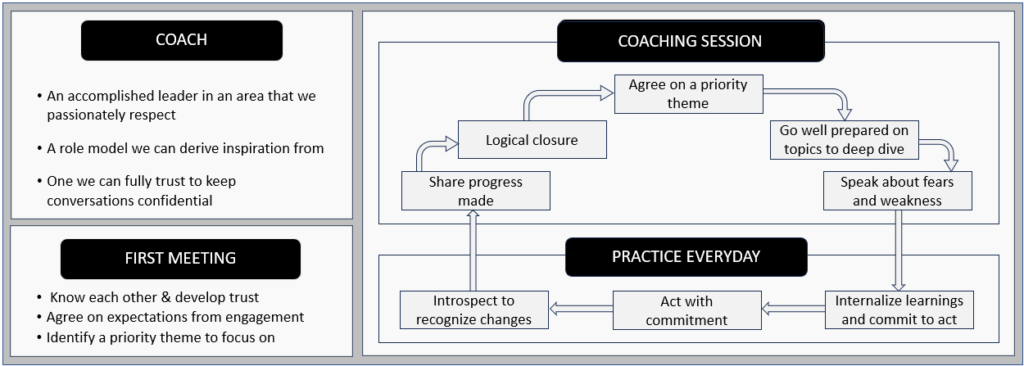I have learnt a lot from people, experiences, books and online resources during my 25-year professional career. For the first time, I had the good fortune of formal coaching interventions during 2023 and benefited from three different coaches. All of them helped me understand my strengths and improvement opportunities to come up with a credible development plan.
I am not a certified coach, so with this call out, let me start with my personal perspective on who can be a coach. It should be a leader who is accomplished in an area that we passionately respect, one we consider role model and derive inspiration from. A coach is not a teacher or manager who can instruct on what we should do. Rather, a coach helps in discovering ourself by asking questions that enables introspection and offers possible solutions when asked, leaving the decision choice to us. Most importantly, a coach should be one we can fully trust to keep conversations confidential.
All my three coaches had distinct approaches and each one of them helped me immensely in different ways. One common factor was rich experience that I have learnt from. It is important for us to understand our coach and figure out how to leverage the opportunity. The rest of the blogpost covers how I accomplished it.

Knowing each other: I mentioned trust as an important factor in a coaching relationship and we cannot trust strangers. So, it is important to start the engagement by knowing each other. In my case, I already trusted one of my internal coaches and an informal breakfast conversation with the other covered this part. While we are likely to know any internal coaches to some extent, I did some research on my external coach before the first conversation. This helped me strike a good chord during the first conversation and build trust.
Agree on expectations: Once the “knowing” part is complete, the first meeting should also cover setting ground rules and expectations. It is important to recognize that the coachee is the primary benefactor and should drive the engagement.
Identify a priority to focus on: Two of my coaches asked me questions and pretty much took control of the engagement, which made it easy for me. I still had to follow-up on discussion points and demonstrate that I am serious about learning from them for self-improvement. While there are many themes and topics that might be of interest for coaching engagement, I focused on one or two at a time, delved deep over multiple conversations before moving on to others. It is ideal to end the first meeting with the priority theme to start with.
Go well-prepared: This is possibly the most important part of the process to benefit from the engagement. The coachee should diligently follow-up on any previous discussions and start every meeting with those updates followed by listing down items wish to be covered.
Speak about our fears and weakness: My best learnings were when my coach acted as a mirror reflecting my weaknesses and suggested solutions from their experiences. When we stand in front of a mirror with make-up, we cannot diagnose imperfections accurately and the results from any follow-up actions will not be effective. The whole point of trust is to be able to confide with our vulnerabilities without concerns of being compromised.
Internalize learnings, act with commitment, and introspect to recognize changes: Coaching conversations and like leadership development programs. Many go into those programs expecting magical transformation and growth overnight, and get disappointed after a few months when they realize nothing much has changed. We should understand these interventions are a source of new ideas that we need to internalize and consciously practice over long periods before expecting results. Due to slow and incremental changes, we might not even notice them ourselves but will be good to introspect regularly to recognize progress. It is like looking at our own pictures from several years back that usually leave us admiring either our present or the past.
Share progress made: I consciously share with my coaches success stories resulting from coaching engagements that made me proud and further reinforced changed behaviors. I believe this will also be an encouragement to the coach as leaders love to hear about positive difference they made to others!
Logical closure: You can’t be stuck on the same theme or topic forever. If that happens, the coaching engagement is not really meeting the objective. I try to conclude a theme with an agreement on future course of action and move to the next one. The cycle starts again with the next priority theme.
Once again, these are just my perspectives on coaching based on my experiences so far and might differ from what coaching manual says. As I learn further, will update this post with any changes. In conclusion, want to thank my coaches and my leadership who gave me this opportunity and this blogpost is a tribute for their help to become a better version of myself!